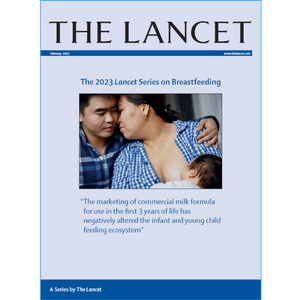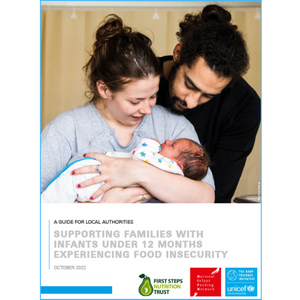Unaffordable infant formula price rises: Safeguarding infant health and safety
Recommendations for the UK Government
Families are under growing pressure to afford infant formula and other essentials to support their babies’ early years. Infant formula prices have risen above inflation over the past two years – bringing the cost of feeding a 10-week-old baby on first stage infant formula to between £44 to £89 per month.
In late 2023 the Government’s independent Competition and Markets Authority (CMA) revealed that some infant formula companies boosted profits by raising prices 25% over two years, and further highlighted strong consumer brand loyalty to increasingly expensive infant formulas, despite the nutritional equivalence of all infant formulas in the UK.
Responding to this issue, Shereen Fisher, UNICEF UK Baby Friendly Initiative Programme Director, said:
It is unacceptable that a small number of powerful infant formula brands are exerting control over the market and putting profits ahead of the welfare of babies by increasing prices significantly higher than their costs – leaving the Government and taxpayers to pick up the bill. With the Healthy Start scheme failing to cover the cost of a tin of formula, it is not right that companies continue to profit off struggling families.
Infant formula is an essential food for a baby who is not exclusively breastfed. The Competition and Markets Authority report reveals that, whilst all first infant formulas are nutritionally equivalent, parents are brand loyal and feel reluctant to switch to cheaper products due to misleading marketing claims that expensive options are better.
To help protect the most vulnerable babies, we urge the Government to act to ensure infant formula prices in the UK are justified and fair, including by regulating pricing and introducing a price cap. This would also enable Healthy Start to stretch further for families that rely on it to purchase infant formula.
The UK Committee for UNICEF (UNICEF UK) strongly believes that families for whom breastfeeding is not an option, or choose not to breastfeed, must be able to access an affordable and consistent supply of infant formula. Importantly, all first infant formulas are nutritionally equivalent and meet the same legal requirements, so there is no evidence or reason for such variation in cost.
Local support should be available for families struggling to afford formula. While many Local Authorities and Health Boards have options in place, not all families can access these or feel comfortable doing so. Additionally, schemes like Healthy Start are failing to keep pace with inflation and spiralling costs, and don’t reach all parents who need it.
During times of financial difficulty, babies fed with infant formula can become increasingly vulnerable. It is vital that services work together to ensure families at risk are given timely and sensitive support to meet their needs.
Recommendations
1. The UK Government should establish policies and effective and accessible welfare schemes to protect families on a long-term basis against unjustified infant formula price rises, for example by:
- increasing the value of the Healthy Start scheme in England in line with food inflation and widening eligibility of the scheme to support families on Universal Credit or equivalent benefits. The current eligibility threshold for household income is just £408 per month or less (excluding benefits) and no first infant formulas are currently affordable within the scheme, including even the cheapest brands.
- introducing a price cap on infant formula to bring down prices on a regulated basis.
2. The UK Government should strengthen UK Law on the marketing of infant formula and breastmilk substitutes by fully adopting the International Code on the Marketing of Breastmilk Substitutes (the Code), thereby committing to protect families by:
- passing, monitoring and enforcing laws to prevent the promotion of infant formula in line with the Code, including prohibiting misleading nutrition and health claims by companies designed to increase brand loyalty and market pricier products as nutritionally superior.
- requesting industry to commit to full compliance with the Code and subsequent World Health Assembly resolutions.
3. The UK Government should commit to deliver a Baby and Toddler Guarantee, ensuring that parents can access the basic services they are entitled to. For infant feeding, this would include:
- providing adequate resources and support to Local Authorities and Health Boards to collect data on local need, provision and uptake of services.
- investing in policies and programmes to support infant feeding in every local area.
- ensuring Local Authorities and Health Boards have pathways in place that are easily accessible for families with young children experiencing financial difficulty. See our guidance for Local Authorities and Health Boards on Supporting families with infants under 12 months experiencing food insecurity.






